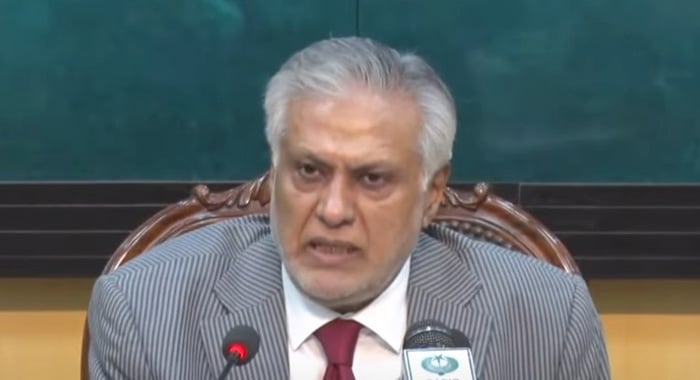Deputy Prime Minister and Foreign Minister Ishaq Dar on Wednesday termed his recent visit to China as “extremely successful,” announcing that China had reaffirmed its support for Pakistan’s sovereignty and territorial integrity, expressed readiness to launch the second phase of CPEC, and reiterated its backing of Pakistan’s stance on Kashmir. He said Pakistan, China, and Afghanistan had reached a trilateral understanding to eradicate terrorism from the region through coordinated efforts.
Addressing a press conference in Islamabad following his visit, Dar said the trip was undertaken on the special invitation of his Chinese counterpart. He held high-level meetings on Tuesday, followed by a trilateral foreign ministers’ meeting with China and Afghanistan on Wednesday. “The three countries discussed regional developments, the situation of Afghan refugees, and trade cooperation,” he stated, adding that Pakistan had already implemented the agreements reached during his April 19 visit to Kabul.
Dar noted that Pakistan has long faced criticism for slow implementation despite reaching decisions, but stressed that his government had ensured follow-through on agreements made with Afghan Foreign Minister Amir Khan Muttaqi. He lauded China as a consistent partner of Pakistan in all circumstances.
Highlighting the historical context, Dar said Sino-Pak friendship dates back to May 21, 1951, and is viewed globally with great respect. He invited the Chinese foreign minister to visit Islamabad for the next round of the China-Pakistan Strategic Dialogue, to which a positive response was received.
He said China had once again voiced support for Pakistan’s position on Kashmir. “From April 23 to May 10, we remained in contact with nearly 60 countries. We did not allow the false narrative of a neighboring country to take hold globally. Their propaganda—like claims of downing F-16 jets—was exposed,” he added. “We told India that unlike them, we are not cowards. If we are compelled to strike, we’ll do so with clarity.”
Dar recalled that while India’s narrative gained traction after Pulwama, Pakistan had preemptively countered their recent attempts. He mentioned that after the Pahalgam incident, Pakistan offered an independent investigation. “By 2017–2018, terrorism had been eradicated from our soil. It resurfaced due to internal missteps,” he said, in an apparent reference to former ISI chief Faiz Hameed’s controversial visit to Kabul, remarking that “someone had gone there just for tea.”
He said the three foreign ministers agreed not to allow their respective territories to be used for terrorism. “China is ready to begin CPEC Phase-II with the current government,” Dar confirmed, also thanking Beijing for its consistent support during Pakistan’s negotiations with the IMF.
The deputy PM highlighted progress on regional connectivity, stating that during the previous PDM government, work was initiated on the Pakistan-Afghanistan rail transit corridor, which included Uzbekistan. He added that China had shown interest in investing in this corridor, and that the Pakistan-Uzbekistan-Afghanistan rail project would soon be finalized. Discussions were also held to extend the Belt and Road Initiative to Afghanistan and to connect Peshawar to Kabul via highway.
“If China builds the Peshawar-Kabul highway, it will open up direct access to Central Asia and make Gwadar Port fully operational,” he said.
Commenting on recent security incidents, Dar said, “What happened yesterday in Khuzdar has caused deep anguish. God willing, the region will soon be cleansed of terrorism. The days of these terrorists are numbered.”
He emphasized the need for joint regional efforts, underlining that diplomatic, trade, and security engagements with China were robust. He reaffirmed Pakistan’s stance that Afghan soil must not be used against it, and outlined new plans to regulate Afghan refugees. “Afghan nationals entering Pakistan will now be issued a one-year multiple-entry visa under a ‘One Document Regime,’ with a $100 fee,” he said.
Dar concluded by saying that China has deep strategic interests in Pakistan and supports a terrorism-free region. “All three countries—Pakistan, China, and Afghanistan—have agreed not to let terrorism thrive under any guise. Joint operations and strict action will be taken against any such groups.”





